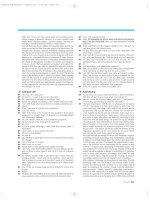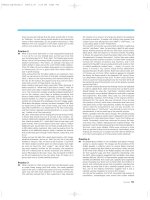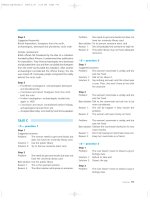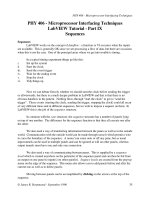Tài liệu A resource for reading and words part 9 doc
Bạn đang xem bản rút gọn của tài liệu. Xem và tải ngay bản đầy đủ của tài liệu tại đây (240.8 KB, 15 trang )
^ EXERCISES
Complete the sentences with a suitable form of the words
defined above.
1. The more you try to decipher the more it becomes.
2. Top 20 games are now almost never converted to run on it,
which purchasers would find very
3.' His continues to be one of deciding whether to attack \
or to stay back
4. Books that adults too are just as' important; <vve,are,
after all, the ones who have to do the reading.
5. The gendarme ordered the students their belongings
in a tidy pile against the wall.
READING COMPREHENSION
1. Sometimes children surprise their parents •„
A) and always want them buy their favorite toys.
B) by choosing cheap and ordinary toys.
C) when they get frustrated while choosing a gift.
D) can not decide what to pick up when buying a toy.
E) because they only want to buy expensive toys.
2. It is obvious in the passage that children of different ages
A) don't prefer the same toys.
B) are fond of the toys that make sounds;
,C) don't discriminate between the toys because anything will
make them happy.
D) want to buy toys that appeal to their parents.
E) always sit up when they are playing with their toys.
3. While a two-year-old child likes toys that move,
A) a-three-year old one chooses colorful toys.
B) an eighteen-year-old-child doesn't like to use his hands.
C) a baby wants to .create things with his hand.
D) a one-month-old bab
s
- prefers toys that will attract his
attention.
E) a twenty-month-old cli. d of toys that he can chew
PASSAGE 61
SCHOOLING
In strictly practical terms, schooling yields three rewards, and
the amount of each reward increases in proportion to the
amount of schooling. First the individual who is well
schooled stands the best chance of getting any job, other
things being equal. Thus, the chance of unemployment is
reduced. Second, the individual with a good background is
the one chosen for advancement and promotion, thus
enabling him or her to earn more over the long run. Third,
because of rewards one and two, the educated individual has
more personal freedom. Such a person will have more job
opportunities from which to choose, is less threatened with
unemployment, and can be freer economically because of his
or her higher earning power. The decision in favor of further
schooling needs to be encouraged if only for the above listed
pragmatic reasons.
VOCABULARY
•'> "DEFINITIONS
Strictly; precisely
To school: to educate
Further: more, additional
Unemployment: joblessness
Background: Personal history
In favor of: In support of
The
long run: a long period
The long run:
a long period
To threaten: To be likely to harm
Promotion: Advancement, raise
To encourage: To give confidence to
To stand a chance: to have a chance
In proportion to: compared with
Pragmatic: Practical rather than theoretical
199
To yield: To give
Reward: benefit
Equal: the same
To reduce: to decrease
Advancement: progress
To enable: To allow
Opportunity: Chance
^ EXERCISES
Complete the sentences with a suitable form of the words
defined, above.
1 a child should be excluded from a pub garden if it is
used principally as a drinking area.
2. Jobs under the new scheme will command a salary time
worked.
3. Even in the more developed countries where the structures
necessary for educational and career are more widely
available and accessible, there are often barriers
confronting the individuals.
4. Workers planning to go on strike to paralyze certain
. sectors of the economy.
5. The government is expected to take a more approach to
economic matters
READING COMPREHENSION
1. The more educated a person is
A) he will only have three rewards in return for his schooling,
B) the more opportunities and freedom he will have
C) the higher the chance of unemployment is
D) the more equal he should be to get a job.
E) the better the chances to earn little.
2. Good educational background ,
A) takes a long time to gain.
B) does not mean that.the person will have freedom.
C) provides fewer job opportunities to choose from.
D) helps one to obtain higher positions where one works.
E) decreases the amount of each reward one can get.
3. If the pragmatic reasons are not one's goals
A) one should be encouraged to go on one's education.
B} it is not necessary for further education.
C) he can be freer economically.
D) one is less threatened with unemployment.
E) earning power of a person will rise.
PASSAGE 62
PRIMING METHOD
Did you ever have someone's name on the tip of your tongue,
and yet you were unable to recall it? When this happens
again, don't try to recall it. Do something else for a few
minutes, and the name may pop into your head. The name is
there, since you have met this person and learned his or her
name. It only has to be dug out. The initial effort to recall
primes the mind, but it is the subconscious activities that go
to work to pry up a dim memory. Forcing yourself to recall
almost never helps because it doesn't loosen your memory; it
only tightens it. Students find the priming method helpful on
examinations. They read over the questions before trying to
answer any of them. Then they answer first the ones of which
they are most confident. Meanwhile, deeper mental activities
in the subconscious mind are taking place; work is being
done on the more difficult questions. By the time the easier
questions are answered, answers to the more difficult ones
will usually begin to come into consciousness. It is often just
a question of waiting for recall to be loosened up.
VOCABULARY
> DEFINITIONS
To loosen: to become free. To tighten: To squeeze
Consciousness: Awareness, perception Dim: dark
To pry: to poke one's nose in, to find out Initial: First
To dig out: to find To prime: To prepare
To be confident: To be certain To prime: To prepare
To pop into: to go very quickly To recall: to remember
On the tip of one's tongue: (be) just going to say (it)
Subconscious: (of) mental activities that one is not aware
. r EXERCISES
Complete the sentences with a suitable form- of the words
defined above.
1. 'My father ran a pretty tidy ship," he , in wistful
recollection.
2. It was a day to remember; we were all quite taken by Fair
Isle and I took the opportunity a few facts ana iigui* ^
about this remote island.
3. It later came out, he and other contestants were being
with the answers beforehand
4. You are into my affairs, the next you say you hate
people poking their noses into other's affairs.
5. The same song repeated over and over again, throbbing in
my head, making my chest
READING COMPREHENSION
1. It is suggested that if a person does not remember a name or
something else
A) it will pop into his head immediately,
B) that name is always on the tip of his tongue.
C) he shouldn't let the subconscious activities prime the mind.
D) the mind should only be forced and the name must be found.
E) he should not force himself to remember it.
2. The best way to loosen o ur mem or y wh en we fai l t o reca ll
something is
. A) to meet that person and learn his or her name.
B) that we should read over the questions before answering the
easy questions.
C) to deal with something else for a while.
D) related to being confident of oneself.
E) .struggling to recall what we want to.
3. If students skip the difficult questions without forcing
themselves and work on easier ones
A) mental activities in the subconscious mind will succeed in
answering the easy questions.
B) they won't be able to do more difficult ones and not try to
answer all of them.
C) p riming method won't help them at all 'and they wi ll be
unsuccessful.
D) subconscious activities in the mind will work on difficult
questions and make the students ready for them.
E) answers to more difficult questions will only remain in the
subconscious mind and the result will be failure.
PASSAGE 63
FRIENDSHIP-
Sheer proximity is perhaps the most decisive in determining
who will become friends. Our friends are likely to live
nearby. Although it is said that absence makes the heart grow
fonder, it also causes friendships to fade. While relationships
may be maintained in absentia by correspondence, they
usually have to be reinforced by periodic visits, or they
dissolve. Several researchers decided to investigate the effects
of proximity on friendships. They chose an apartment
complex made up of two-story buildings with five apartments
to a floor. People moved into the project at random, so
previous social attachments did not influence the results of
the study. In interviewing the residents of the apartment
complex, the researchers found that 44 percent said they were
most friendly with their next-door neighbors, 22 percent saw
the people who lived two doors away the most often socially,
and only 10 percent said that their best friends lived as far
away as down the hall. People were even less likely to be
friendly with those who lived upstairs or downstairs from
them.
VOCABULARY
r DEFINITIONS
Sheer: pure, absolute
Decisive: critical/important
Absence: Not being present
To fade: to die away,
Attachment: connection
To reinforce: To strengthen
To dissolve: To weaken
To investigate: To examine
Proximity: closeness, nearness
At random: without purpose
Fond: loving, affectionate
To maintain: to continue
Correspondence: mail, letters
Resident: inhabitant
Previous: earlier, before
Absentia: not being
together
To determine: to decide, to find out
^ EXERCISE
Complete the sentences with a suitable form of the words
defined above.
1. It was going to be pain to say it, but acid agony to
hold it in.
2. Martin Puryear received a award for sculpture
v
that
evokes the human struggle.
3. This sort of living of course the sense of isolation and
loneliness
4. Before the summer it was time, once more, for us-tuget
together.
5. Oxygen more freely in cold water than in warav
READING COMPREHENSION
1. The writer points out that friendships will not last long
A) if relationships are maintained by correspondence when
people are not together.
B) as long as they are not reinforced by periodic visits.
C) because nearness makes the heart grow fonder.
D). unless people are close to each other.
E) when people get along well with each other.
2. The reason why investigators chose an apartment complex was
to find out
A) whether closeness was a determining factor in friendships.
B) .how previous friendships affected, the relationships of people
• living together.
CJ how friendly people were with their next door neighbors.
D) why people were less friendly with those who lived upstairs.
E) an effective interviewing method so that they could carry out
their investigator.
3. People living downstairs
• A) were most friendly with those living as far as down the
corridor.
B) made only friends with their neighbors two doors away.
C) didn't find their next door neighbors friendly
D) were less friendly than those who lived upstairs.
E) were found to have almost no friends upstairs.
PASSAGE 64
LOVE
There is only one passion which satisfies man's need to unite
himself with the world, and to acquire at the same time a
sense of integrity and individuality, and this is love. Love is
union with somebody, or something, outside oneself, under
the condition of keeping the separateness and integrity of
one's own self. It is an experience of sharing, of communion,
which permits the full opening of one's own inner activity.
The experience of love does away with the necessity of
illusion. There is no need to inflate the image of the other
person, or of myself, since the reality of active sharing and
loving permits me to go beyond my individualized existence,
and at the same time to experience myself as the bearer of the
active powers which constitute the act of loving. What matters
is the particular quality of loving not the object
VOCABULARY
^ DEFINITIONS
Passion: enthusiasm, excitement
To satisfy: to please
To unite: to join, to bring together
To acquire: to get, to obtain
Integrity: honor, honesty, reliability
Separateness: being apart
Communion: unity, relationship.
To permit: to allow
Illusion: false idea or belief
To Inflate: to increase
Image: impression
Existence: survival
Bearer: owner, possessor'
Inner: Inside
To constitute: to form, to make up
To do away with: to get rid of, to dispose of
128
> EXERCISE
Complete the sentences with a suitable form of the words
defined above.
1. She had a for fine music and fine art.
2. Yet no-one could ever have doubted either his sincerity or
in fighting for what he always felt was right.
3. My father had bought the farm at an auction, at what
turned out to be an price,
4. The belief that this can continue is an "
5. His courage and nobility are innate rather than through
circumstances
READING COMPREHENSION
•1. We can infer that the love that the writer talks about
A)
is uniting yourself only with the person you love.
B)
causes one to lose one's individuality and integrity.
C)
does not permit the experience of sharing.
D) is not restricted to one person or a thing.
E) is the union in one's own inner activities.
\
2, The writer emphasizes that a person must
A)
experien ce s haring and communion in his life
B)
m aint a in h i s s ens e of i ndep e n den c e wh e n u n iti n g wit h
another person or anything.
C)
bear in mind the necessity of illusion when falling in love.
f D) not have a sense of integrity and individuality.
[ E) give more importance to the image of the person he loves.
3, What is more important for the writer is
A) the nature of loving rather than what it is directed at.
B)
his ability, to unite a person with another.
CJ the person he feels affection towards,
D) to instill active sharing and loving in other people.
,E) the things or people that he directs his love towards.
PASSAGE 65
••RAILWAYS
Those who welcomed the railway saw it as more than a rapid
and comfortable means of transit. They actually saw it as a
factor in world peace. They did not foresee that the railway
would be just one more means for the rapid movement of
aggressive armies. None of them foresaw that the more we are
together, the more chances there are of war. Any boy or girl
who is one of a large family knows that. Whenever any new
invention is put forward, those for it and those against it can
always find medical men to approve or condemn. The anti-
railway group produced doctors who said that tunnels would
be most dangerous to public health; they would produce
colds, catarrhs and consumptions. But the pro-railway groups
were of course able to produce equally eminent medical men
to say just the opposite,
VOCABULARY
> DEFINITIONS
To put forward: To present Means: Ways
Against: in opposition to Pro; for, in favor of
To .condemn: To criticize Aggressive: Violent
Consumption: Tuberculosis For: In favor of
To foresee: to predict, to anticipate Eminent: Famous
To welcome: To accept, to approve
Catarrh: flow of liquid of the nose and throat
> .EXERCISES
Complete the sentences with a suitable form of the words
defiiied above.
1. Their ten years of marriage have been fraught with
difficulties, that neither coxild have
2. I stated that I would not Hesitate and punish
unacceptable behavior.
3. That this person should harbor feelings towards you is
unimaginable, but then suddenly, she goes to poke you in
the eye — and' you blink.
4. Tass quoted local scientists as confirming the incident.
5. Since she had taken the trouble to travel all this way , we
should find some of coercing her to stay.
READING COMPREHENSION
1. Those who welcomed the railway did so because
A)
it was a convenient way of making a change.
B)
they realized it would not get faster or more comfortable for a
very long time.
C)
they thought it would enable armies to be moved rapidly.
D)
the y k n ew peop le' s w o uld fi g ht wi th e ach ot h er whe n t hey
were together.
E)
they expected more than just a quicker way of traveling.
2. All boys and girls in large families know that
A)
there are always people to condemn a new invention
B)
we are together more than we used to be.
C)
a lot of people being together makes fighting.
D)
the faster aggressive armies are moved the more chances there
are of war.
E), it was a rapid and comfortable means of transportation.
3. The anti-railway group
A)
tried to show that tunnels were certain to cause colds.
B)
said that tunnels would be cold.
C)
produced doctors who would show the colds they had caught
in tunnels.
D)
w oul d show peop l e t h e co l ds a nd c a tarr h s t h ey h a d g o t in
tunnels.
E)
wer e no t a gai nst an inv e nt i on whi c h w oul d f aci lit ate th eir
lives.
PASSAGE 66
THEPOOK
It is commonly assumed that poor are lazy people who could
work if they were willing. In fact, over 60 percent of the poor
consist of children under age fourteen, elderly people over
age sixty-four, and people sof working age who are ill or in
school. Another quarter work but do not earn enough to rise
above the poverty line. This leaves less than 15 percent of the
poor of working age who do not work, and the vast majority
of those are the mother of young children. When it comes to
work, the poor do not look as bad as their reputation, for most
of them are too old, too young, too sick, or too busy caring for
children to work,
VOCABULARY
> DEFINITIONS
Quarter: One of four equal parts
Willing: Eager, keen
To consist of: To be made up of
Poverty: neediness
Vast: Huge, enormous -
Reputation: Being favorably known
To care for: To be concerned about
> EXERCISE
Complete the sentences with a suitable form of the words
defined above.
1. I would be very pleased to hear from anyone to accept
this invitation.
2. While provision for his guests is more than adequate, his
bedroom a single bed with a small television at its foot,
remotely controlled.
3. Low income, poor quality housing with little or no
insulation, and reliance on expensive and inefficient'
heating systems fuel
4. With the rise of modernism, Rodin's fell; with the
decline of modernism/ Rodin's fame is growing again.
5. Iris is totally dependent on Donald who retired early .
his wife.
READING COMPREHENSION
1. Most people think that poor people
A)
can't work.
B)
don't like working,
C)
consists of children under fourteen.
D)
earns enough money for a decent life.
E)
are willing to work but can't find work.
2. The majority of the poor
A)
are not able to work for various reasons.
B)
commonly believe that they are lazy.
C)
are children and they are too ill to work.
D)
prefer caring for children to work.
E)
are not willing to go over the poverty line,
3. The biggest part of the poor of the working age who don't work
is
A)
elderly people over age sixty-four.
B)
children under age of fourteen.
C) the mother of young children.
D) people who are ill or in school.
E) people too young to work.
www.elt-time.com/forum
PASSAGE 67
HOMES
The institutional care we provide to our older people is a
good reflection of the overall attitude of our society toward
the aged. In the past few years, nursing homes have received
wide attention as boring, meaningless places where people
often have little else to do but wait for the end of their lives.
Senile wards in mental hospitals are even worse. One of the
appalling things about nursing homes has been the
unwillingness of people on the outside to show real concern
for what happens in these institutions. Even people who are
entrusting a parent to the care of a home rarely ask about the
nurse-patient ratio, about the kind of creative facilities or
physical therapy equipment available, or even about the
frequency of doctor's visits.
VOCABULARY
Institutional: Related to the (building of) organization for
social welfare
Reflection: Thought
Attitude: Feeling, manner
Nursing homes: Attention, treatment places for old people
Senile ward: Division for the old people in a hospital
Appalling: Shocking
To entrust: To trust somebody to safeguard somebody or
something
Ratio: Proportion, percentage
Available: On hand, obtainable









